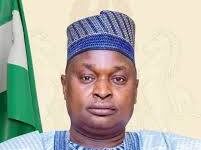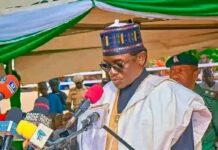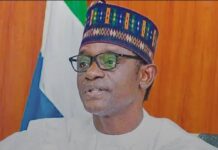Suleiman Hassan Gimba, a “New Wig” as they say, was called to the Bar at the tender age of 22, making him one of the youngest to be enrolled as Solicitors and Advocates of the Supreme Court.
From Yobe, a state that is among the educationally backward in the country, and coming from the North, a region bedevilled by the so-called almajiri syndrome, this is a good omen for the state, region and country.
Can you tell us about yourself?
My name is Suleiman Hassan Gimba. I was born on the tenth of January, 1995 in Potiskum, Yobe State. I started my education at FECOET Primary School in Potiskum. My secondary education was quite complicated, though. Apart from being “fastracked” from Primary Three to JS One, I had been to over a dozen schools (laughs). Well, not really over a dozen but I have been to about four of schools and that actually exposed me to a lot of people; different kinds of people.
I started at Zaria Academy, Shika, in 2004, when I was barely nine years old. There, I met amazing people, people I am still in contact with. I left in JS two, joined Government Science and Technical College, Potiskum and left in JS three, after which I dropped a year and started from JS two at the International Private School (IPS) Potiskum, because the highest class there was JS 2. Again, I left there in JS three to where I started, FECOET, which has a demonstration secondary school, where I found stability because I was there through SS one to three. I went through this, I think, because of my parents’ desire to get me the best education they could afford.
The school was very important to me for three reasons. First, joining the Arts department of the school served as the gateway for me to study law. Secondly, Art Class was a gift that kept giving; it made me a reader and subsequently, a poet and now an aspiring novelist. Thirdly, I was exposed to my first leadership role. I was made the House Captain of Blue House and that helped me through ABU Zaria and with “Forward Yobe, Forward (FYF)” a Non-Governmental Organization I founded in 2015.
You were called to the bar at the tender age of 22, how do you feel about that?
I have been looking for the words to describe this feeling since the day of my call but couldn’t and still can’t. suffice to say it has been Allah’s blessings and favour all along. One, for seeing me through and guiding me; surely it’s not by my strength because many had fallen along the way. He gave me wonderful and loving parents who toiled day and night, sacrificed the little they had so I can have a life and a future.
But why law?
 Same question I ask myself every day. You see, the desire has always been to serve (the country) and as a kid my desire was to be in the military. I sat for the entrance exams of the Nigerian Military School, Zaria in 2003, passed but unfortunately failed the interview/physical obstacles. And with that dream gone, I decided to follow my father’s footsteps and be a journalist, then an engineer and then a medical doctor. I was just a child, a bit naive maybe and every little thing would sway my decision. It was as if I wanted to be everything but then, something happened… I started watching a TV Series my father bought for us, called “Justice”. It is a legal fiction and I believe Victor Garber is the main character. They did amazing things, save innocent people from impossible situations. “My client is not ‘not guilty’ but innocent” that is the message he passed throughout season one. And at some point, I told myself “if this is what lawyers really are; if this is what lawyers actually do, then I want to be one of them and I want to be among the best of them.”
Same question I ask myself every day. You see, the desire has always been to serve (the country) and as a kid my desire was to be in the military. I sat for the entrance exams of the Nigerian Military School, Zaria in 2003, passed but unfortunately failed the interview/physical obstacles. And with that dream gone, I decided to follow my father’s footsteps and be a journalist, then an engineer and then a medical doctor. I was just a child, a bit naive maybe and every little thing would sway my decision. It was as if I wanted to be everything but then, something happened… I started watching a TV Series my father bought for us, called “Justice”. It is a legal fiction and I believe Victor Garber is the main character. They did amazing things, save innocent people from impossible situations. “My client is not ‘not guilty’ but innocent” that is the message he passed throughout season one. And at some point, I told myself “if this is what lawyers really are; if this is what lawyers actually do, then I want to be one of them and I want to be among the best of them.”
With encouragement and support from my parents and my guardian, Professor MK Othman, Executive Director of NAERLS, Zaria, I secured admission to study Law in Ahmadu Bello University, Zaria. It was made easier because I passed my SSCE, JAMB and Post UTME in flying colours and at first sitting.
Luckily for me, I have an aunt who is a magistrate. I used to watch her sittings on Thursdays, or whenever I could. Thursdays and Fridays were free days in my Islamiyya (Islamic School). And she had never let my head drop since. She is proud that I have been called, why? I have always voiced my opinion against what is not right, that won’t change now and the call made me feel like I have been handed a cosh or a cudgel, with which to defend the defenseless. And she knows that I look up to her.
Law is seen by many as a very difficult course, how did you survive at the University and at law school?
I don’t think there is anything difficult in law, especially the first year. We didn’t offer any law course at Ahmadu Bello University, Zaria apart from Legal Method. And from the moment we started studying law proper, in level two, we were already rooted and used to the system. It is also about one’s mind-set; see it as difficult and it will make life a living hell for you. I should know because I have seen what it did to people. And I am not saying that one should be nonchalant about it or that approaching it calmly makes it a stroll in the park; one still has to work for his grades. Moreover, we were taught about the law; what it is and not what it ought to be.
But a year at law school is the most gruesome year of my life. Law school is different; hectic, lectures are very intense: it is a bit of an oddity as far as schools are concerned. But one thing is certain, one can’t go to law school and not learn anything. They have the best lecturers and the best learning method in the country. And let us not forget that the bar finals exam is in a league of its own. I am glad to be out of there, alive, unscathed.
What is the biggest challenge you faced in the university or at law school?
Well, one can’t go through any Nigerian University without being frustrated by ASUU. That I went through for seven unforgettable months in 2013. I was at home for so long that I actually got tired of staying at home; it was as if they were trying to delay my destiny.
At law school, it was about me challenging myself, trying to find the right time to read because of the tight schedule. But, Alhamdu liLlah, I had the efficacy to make it and God answered my prayers.
You said you are also a poet and an aspiring novelist, how far have you come in this regard?
Well, not really a poet in the real sense. I am what you may call “a baby poet”. I wrote my first, together with a friend, Yakubu Ayuba, when I was in SS Two and it was published in Desert Herald. I mostly write for pleasure now, on Facebook, Wattpad or Twitter and mostly only share with friends. I was named the best poet by Arewa Consciousness in a competition they organised in 2016, though. I want to publish a chapbook of like twenty to thirty poems.
I am working on a novel titled “Spine”. My hope is to complete it before 2019, which is a very difficult target considering that prose writing is still a grey area for me.
Can you tell us about “Spine”?
“Spine” is about a new societal problem. The Youth’s greed or rather addiction to drugs, sex and most importantly quest for power, and how likely they are to obtain them through the wrong means. It is about bad guys winning and then maybe pausing at some point to see if it has all been worth it.
So, what is next for you?
I am currently serving with the Federal Judicial Service Commission and while at it, I will love to attach myself with a Law Firm that is also into Pro Bono or a Nongovernmental Organisation giving legal aid to the indigent. That will be a good experience but most importantly it will be the start I am hoping for in my desire to assist the less privileged.
And I will, insha Allah, venture into private practice on the completion of my service.
Why private practice?
A white collar job would have been an option, an easy option. But the desire is to stretch myself, to go out of my comfort zone and in the end, put smiles on the faces of those that still believe that law is the last hope of the common man.
Talking about Law being the last hope of the common man, what do you think of the decision of the Council of Legal Education not to call Amasa Firdaus to the Nigerian Bar because of her insistence to wear her hijab?
I believe we have missed the point, almost everyone has. I am not saying that Amasa Firdaus is wrong, the Council of Legal Education is wrong or those that have been quiet all this while are wrong. The deed has been done and whoever is insisting on playing the blame game, is wrong. I believe there is a court judgement on such issues. But in any case, the Constitution and the United Nations Charter on Human Rights should be allowed to do the talking.
Follow the Neptune Prime channel on WhatsApp:
Do you have breaking news, interview request, opinion, suggestion, or want your event covered? Email us at neptuneprime2233@gmail.com





This shall be the very step for your success…We are really proud of you. May Allah guide you through.